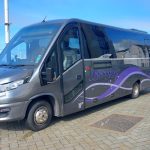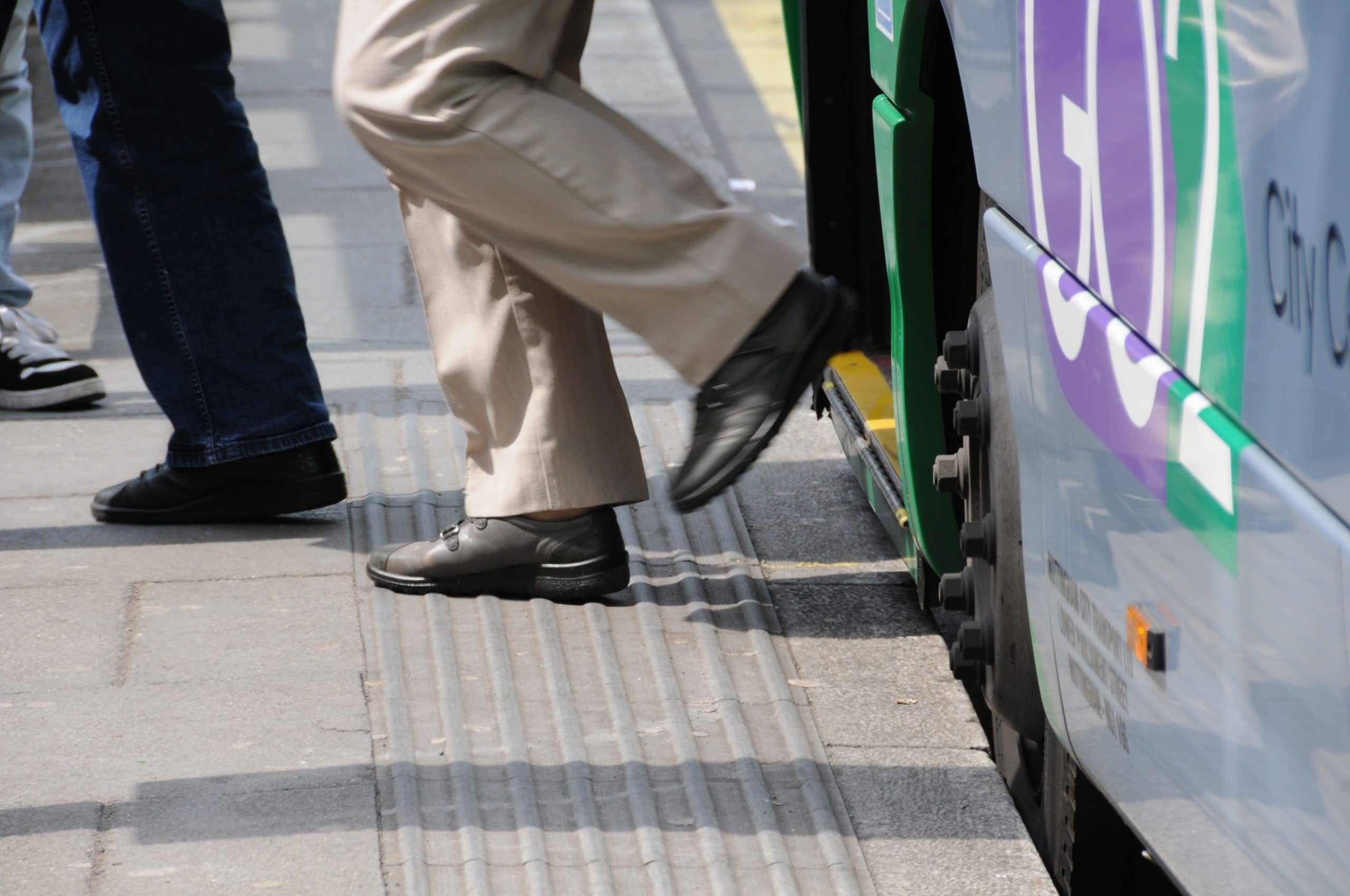Promoted to CEO last year, Sean O’Shea looks back at his 30-year career at Metroline, the changes that have challenged London, and the company’s ambitions to be the best
There are plenty of talented bosses in the bus industry who started their careers on graduate training programmes.
They probably all regularly remember the lessons they learned then, and the skills they developed, even the ones they don’t use day-to-day – like driving a bus.
Sean O’Shea certainly does. And he still likes to get behind the wheel now and again if he can, to keep his hand in. “Learning to drive a bus was probably one of best experiences I had,” he says now, over 25 years after he completed his graduate training. “It helped me immensely in knowing what it’s like to be a driver.”
It was Metroline’s graduate training scheme Sean embarked on in 1990, and it’s Metroline that Sean heads up now as CEO. He’s also CEO of ComfortDelGro’s other brands in the UK and Ireland: Westbus, Scottish Citylink, Irish Citylink, and now New Adventure Travel (NAT) Group in South Wales, too.
He’s a London buses man, but in his own words, London isn’t “the be all and end all” – not to him, and not to Singapore-based ComfortDelGro.
Ownership change
Sean’s has been a career marked by seismic changes to the operating environment. He joined London Buses when it had just been divided into 11 companies, one of which was Metroline, which was later sold in a management buyout. It was later floated, then sold to ComfortDelGro in 2000.

“Probably the biggest change has been privatisation,” he says. “Ownership is a fundamental change. It’s something to get your head around when you start working for new people and see how their motivations change.”
Since then, many more changes in London have affected the operator – not least the election of a Mayor with overall control, and its impact on Transport for London (TfL); improved emission standards and the resulting major fleet upgrades; and Quality Incentive Contracts (QICs) that award operators with bonuses when customer satisfaction is high, and fixes penalties when it is not. But Sean has a positive outlook on change.
On the QICs, he says: “It’s more difficult to achieve because customer satisfaction is subjective – rather than a QIC scheme based on reliability, for example. So it’s challenging, but it’s the right thing to do. If you have an environment where the operator doesn’t really have to care about the passengers, that’s not a good system.”
And on zero emission buses, he says: “No one can disagree with that as a good thing in itself. It’s fundamental.
“The introduction of the congestion charging zone might not have happened without someone prepared to make a bold and potentially personally disastrous decision. Having a mayor who can call the shots makes a huge difference to the direction of London. Sometimes it works, sometimes it doesn’t. But for the mayor to set out their stall is quite helpful for us.”
Sadiq Khan’s accelerated roll-out of the Ultra Low Emission Zone (ULEZ) is a challenge, says Sean – “but a healthy challenge.
“The health of people in London is something we should all believe in.”
Future’s electric
Even in forward-looking London, Metroline is a pioneer for green-energy buses; it took delivery of both the first BYD ADL Enviro400EV double-deckers, then the first Optare Metrodecker EV double-deckers a month later.

It will run 37 Enviro400EVs on route 43, and 31 Metrodecker EVs on route 134.
“They are parallel routes for a fair distance, which will give us the ability to make a direct comparison with how they compete with each other,” says Sean. “In terms of how they’re holding their charge, and any maintenance issues.
“It’s not designed as an experiment, it’s a commercial decision – but it should give us good intel.
“When they’re all delivered, I think outside of China, we’ll have the largest fleet of electric double-deckers in the world.
“Without doubt, the future is electric,” Sean says, though he adds a caveat, because Metroline is partnering with TfL in 2020 to run 20 hydrogen fuel-cell buses from its Perivale depot.
“Electric is certainly the system of choice at the moment. Hydrogen has some cost issues, but electric had them too at the start. So we’ll see how it goes.”
Franchising debate
Sean is also a believer that the franchised model in London suits the city well, and works. But he doesn’t believe it has to work everywhere in the same way.

“I’m a believer in the right model for the right environment,” he says. “The commercial bus model has its place too, and has produced great results over the years. There are lots of urban environments it works in.”
For other places in the UK looking at franchising, he says the need for investment by local authorities is crucial.
“If you want to improve the efficiency of people travelling in a city, you need to invest in mass transit, you genuinely need to restrain car use, and you have to have a system that tackles congestion, otherwise you won’t get the best outcomes,” he says.
It’s a relevant debate for ComfortDelGro, which bought Cardiff-based NAT Group last year, as the Welsh Government is also talking about the future of the bus network.
The business has recruited Adam Keen, formerly of Go-Ahead’s Go South Coast, to head up NAT Group. “He has excellent pedigree working in the commercial bus world,” says Sean. “With our London focus, we didn’t have any natural candidate internally who we could pick up and relocate to Cardiff to start running NAT Group.”
He adds: “As a business we’re pretty agnostic on commercial versus regulated. We’ll work with any organisation, local authority, other stakeholders, customers and traffic commissioners to deliver a good service. We don’t have a particular preference for either model.”
Staff philosophy
Adam Keen’s recruitment from outside the business was a bit of an anomaly.
As the Chief Operations Officer previously, Sean was the “natural choice” to take the helm in 2018 when Jaspal Singh, the previous CEO, departed.
And since then, Metroline has seen a flurry of other high-profile internal promotions, including Stephen Harris to Managing Director, Ian Foster to Group Engineering Director, and Adrian Jones to Engineering Director.

“Part of our philosophy is to try to develop our own guys, at all different levels of the organisation,” says Sean. “Our garage managers have all come up through the ranks, having been drivers or worked as technicians or in administration. That’s got people to believe they’re not in a cul-de-sac – that there will be an opportunity for them to develop.
“It doesn’t stop us looking outside for talented people when we need to. The gene pool does benefit from getting new people.
“But the vast majority work their way through, and that creates a culture where people feel they can get on.”
The big job now
The one thing that Sean doesn’t feel has changed much in the last few years is his role in the business. His promotion to CEO was a natural progression, and as the Chief Operating Officer for a good number of years previously, he was already running much of the show.
“I already had a huge influence on the way the company was run,” he says.
“Some of the shackles have been taken off, and I perhaps have more opportunity to change the business.
“But in some ways, it doesn’t feel like much has changed.
“I’ve had a good experience. My career has been an enjoyable journey, not without its challenges.
“During my graduate training, I didn’t envisage what the world would look like 30 years later. But the ‘big job’ as it was then is definitely not the same ‘big job’ that it is now. The industry and the operating environment have changed so much.”
Sean has ambitions for Metroline to be London’s best bus company – but that doesn’t necessarily mean the biggest. “It’s more like we want to be the most reliable and safest,” says Sean. “We want to be a company people want to work for, in London or anywhere else – that’s what I want us to be judged by.”






















